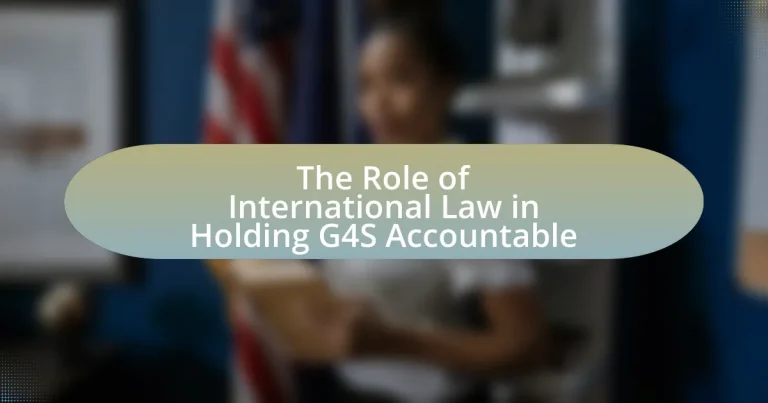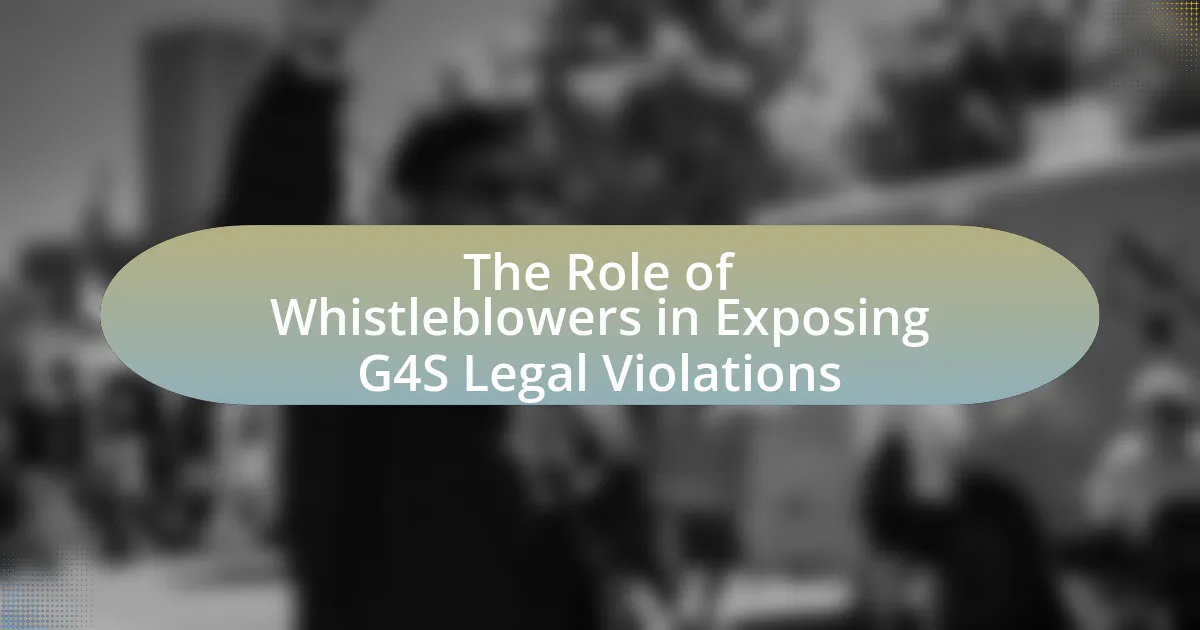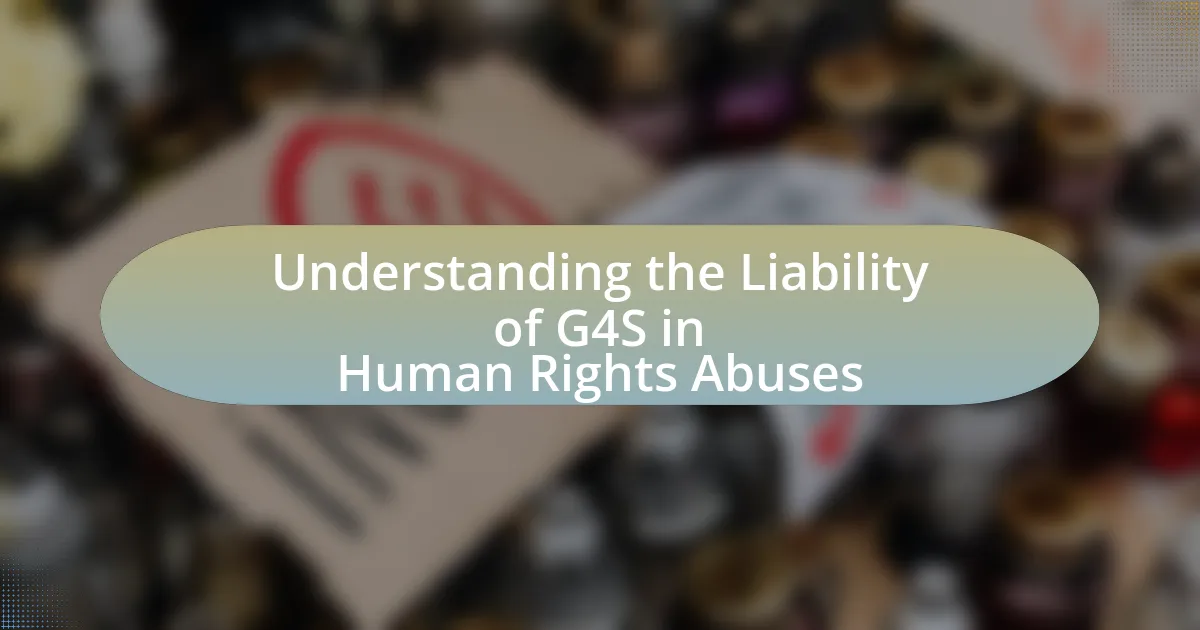G4S, a global security provider, is subject to international law frameworks that aim to hold it accountable for human rights violations and corporate misconduct. This article examines the role of international law, including treaties and conventions, in establishing accountability mechanisms for G4S’s operations, particularly in conflict zones. Key legal frameworks such as the UN Guiding Principles on Business and Human Rights and the Geneva Conventions are discussed, along with the challenges of jurisdiction and the barriers victims face in seeking justice. The article also highlights the influence of non-governmental organizations in advocating for accountability and the necessary reforms to strengthen international legal standards for private security companies.
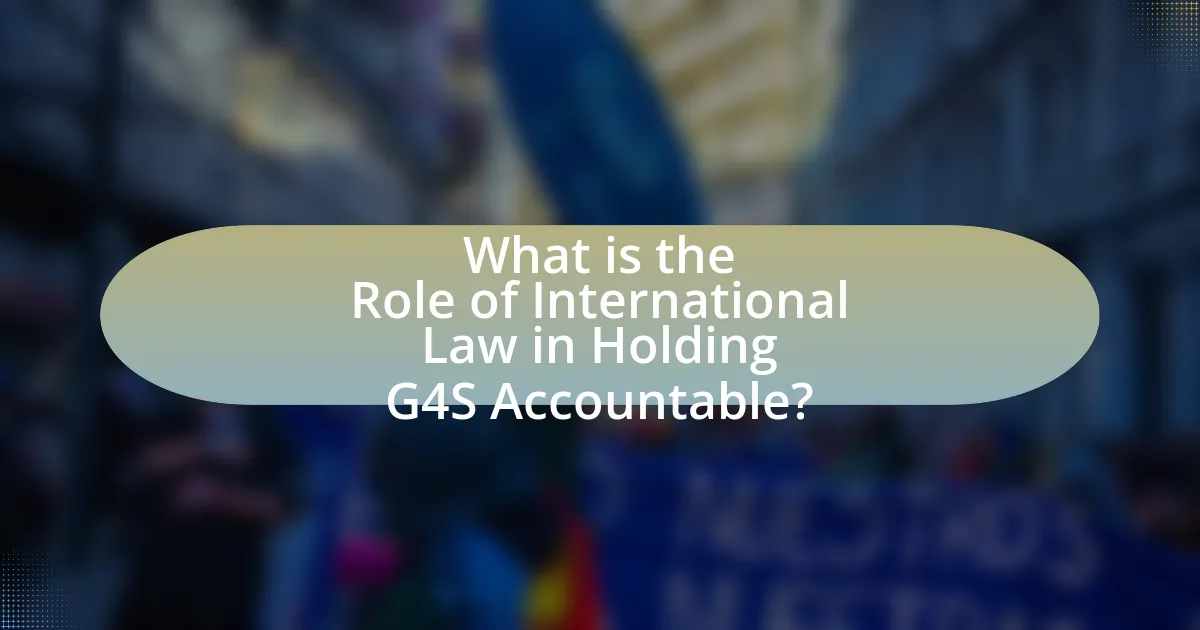
What is the Role of International Law in Holding G4S Accountable?
International law plays a crucial role in holding G4S accountable by establishing legal frameworks that govern human rights and corporate conduct. These frameworks include treaties and conventions, such as the International Covenant on Civil and Political Rights, which obligate states to ensure that corporations like G4S adhere to human rights standards. Additionally, international legal mechanisms, such as the International Criminal Court, can prosecute individuals for complicity in human rights violations, thereby indirectly holding corporations accountable. The United Nations Guiding Principles on Business and Human Rights further reinforce this accountability by outlining the responsibilities of businesses to respect human rights and the need for effective remedies for victims. These legal instruments collectively create a system where G4S can be held accountable for its actions, particularly in contexts where it operates in conflict zones or engages in security operations that may infringe on human rights.
How does international law define accountability for private security companies like G4S?
International law defines accountability for private security companies like G4S primarily through frameworks established by human rights treaties, international humanitarian law, and national regulations that incorporate international standards. These frameworks obligate private security firms to adhere to principles of human rights and ensure that their operations do not contribute to violations, such as unlawful use of force or discrimination. For instance, the Montreux Document, which outlines the responsibilities of states and private military and security companies, emphasizes that these entities must operate within the bounds of international law and be held accountable for their actions. Additionally, the UN Guiding Principles on Business and Human Rights further reinforce the expectation that companies like G4S must respect human rights and provide remedies for any harm caused.
What are the key international legal frameworks relevant to G4S’s operations?
The key international legal frameworks relevant to G4S’s operations include the United Nations Guiding Principles on Business and Human Rights, the International Labour Organization conventions, and the Geneva Conventions. These frameworks establish standards for human rights, labor practices, and the conduct of private security companies in conflict zones. The United Nations Guiding Principles outline the responsibility of businesses to respect human rights and provide a framework for accountability, while the International Labour Organization conventions set forth labor rights that G4S must adhere to in its operations. The Geneva Conventions govern the conduct of armed conflict and the treatment of individuals, which is particularly relevant for G4S in its security operations in conflict-affected areas.
How do these frameworks apply to G4S’s actions in various countries?
International law frameworks apply to G4S’s actions in various countries by establishing legal standards for human rights and corporate accountability. For instance, the UN Guiding Principles on Business and Human Rights obligate companies like G4S to respect human rights in their operations, which has been scrutinized in contexts such as their involvement in detention centers and security services in conflict zones. Reports from organizations like Amnesty International have highlighted instances where G4S’s practices in countries such as Israel and South Africa raised concerns about compliance with international human rights standards, demonstrating the frameworks’ relevance in assessing the company’s actions.
Why is accountability important for companies like G4S?
Accountability is crucial for companies like G4S because it ensures compliance with legal and ethical standards, thereby protecting the company’s reputation and operational integrity. G4S, as a global security provider, operates in diverse environments where adherence to international laws and human rights standards is essential. For instance, accountability mechanisms can prevent human rights violations, as seen in various reports highlighting the need for oversight in private security operations. By being accountable, G4S can mitigate risks associated with legal liabilities and enhance trust among stakeholders, including clients and the communities they serve.
What are the potential consequences of a lack of accountability?
A lack of accountability can lead to significant negative consequences, including increased corruption, diminished trust in institutions, and a culture of impunity. When individuals or organizations are not held accountable for their actions, it creates an environment where unethical behavior can flourish, as evidenced by numerous studies indicating that accountability mechanisms are essential for maintaining integrity in both public and private sectors. For instance, the World Bank has reported that corruption costs developing countries an estimated $1.5 trillion annually, highlighting the economic impact of unaccountable practices. Furthermore, without accountability, victims of misconduct often lack recourse, which can perpetuate cycles of injustice and social unrest.
How does accountability impact public trust in private security firms?
Accountability significantly enhances public trust in private security firms. When these firms are held accountable for their actions, it demonstrates a commitment to ethical practices and transparency, which fosters confidence among the public. For instance, studies have shown that private security firms that implement robust accountability measures, such as regular audits and compliance with international standards, experience higher levels of public trust. This is evidenced by a 2020 survey conducted by the International Security Management Association, which found that 78% of respondents felt more secure when firms adhered to accountability protocols. Thus, accountability not only reinforces the integrity of private security firms but also cultivates a trusting relationship with the communities they serve.
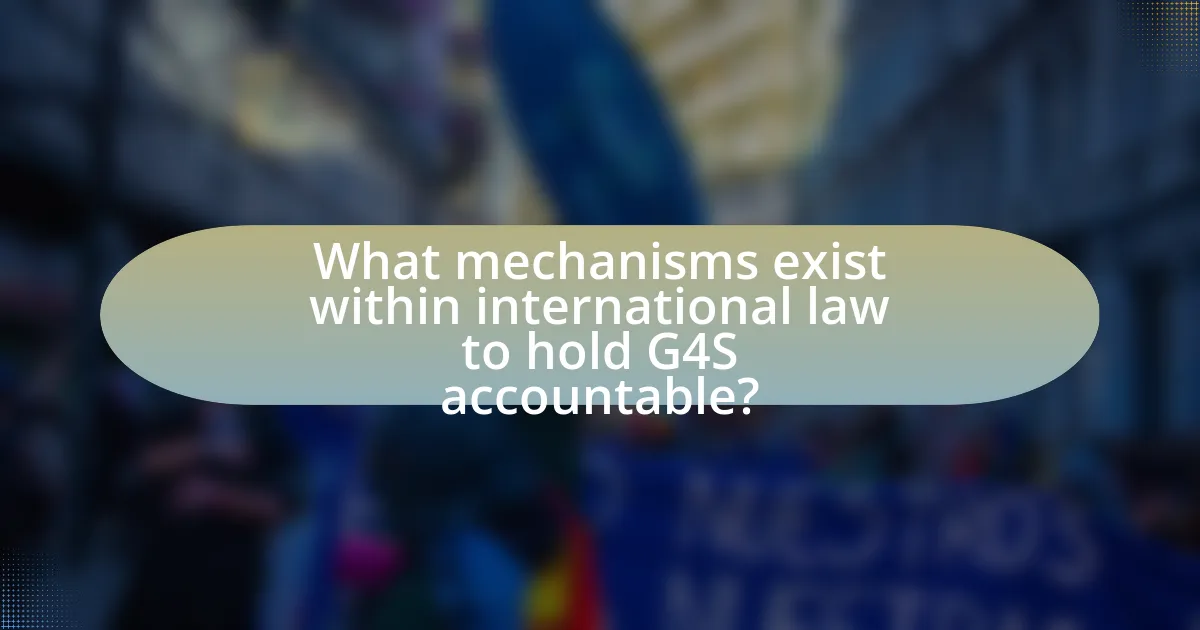
What mechanisms exist within international law to hold G4S accountable?
International law holds G4S accountable through various mechanisms, including human rights treaties, international criminal law, and corporate accountability frameworks. Human rights treaties, such as the International Covenant on Civil and Political Rights, impose obligations on states to ensure that private entities, including G4S, do not violate human rights. International criminal law can also apply if G4S is implicated in war crimes or crimes against humanity, as outlined in the Rome Statute of the International Criminal Court. Additionally, corporate accountability frameworks, such as the UN Guiding Principles on Business and Human Rights, establish standards for corporate conduct and provide avenues for redress for victims of corporate abuses. These mechanisms collectively create a legal framework that can be utilized to hold G4S accountable for its actions.
How do international courts and tribunals address cases involving G4S?
International courts and tribunals address cases involving G4S by evaluating allegations of human rights violations and breaches of international law linked to the company’s operations. For instance, G4S has faced scrutiny for its involvement in detention centers and security services in conflict zones, leading to legal actions in various jurisdictions. Courts may consider evidence of complicity in human rights abuses, such as unlawful detention or excessive use of force, which can result in rulings that hold G4S accountable under international human rights standards. Specific cases, like those brought before the European Court of Human Rights, illustrate how legal frameworks can be applied to corporate entities like G4S, emphasizing the need for accountability in their operations.
What types of cases have been brought against G4S in international courts?
Various types of cases have been brought against G4S in international courts, primarily involving allegations of human rights violations, complicity in torture, and breaches of international humanitarian law. For instance, G4S has faced legal actions related to its operations in conflict zones, where it has been accused of facilitating abuses against detainees. Additionally, cases have emerged concerning the treatment of individuals in private detention facilities, highlighting issues of inadequate care and unlawful detention practices. These cases reflect broader concerns regarding the accountability of private security firms under international law.
What outcomes have resulted from these legal proceedings?
The legal proceedings against G4S have resulted in significant financial penalties and operational changes within the company. Specifically, G4S has faced lawsuits that led to settlements amounting to millions of dollars, reflecting the financial repercussions of their alleged violations of international law. Additionally, these proceedings have prompted G4S to implement stricter compliance measures and enhance oversight of their operations to prevent future legal issues. The outcomes underscore the effectiveness of international law in holding corporations accountable for their actions.
What role do non-governmental organizations (NGOs) play in holding G4S accountable?
Non-governmental organizations (NGOs) play a critical role in holding G4S accountable by monitoring its operations, advocating for human rights, and raising public awareness about its practices. NGOs such as Amnesty International and Human Rights Watch conduct investigations into G4S’s activities, documenting instances of human rights violations and providing evidence to support their claims. For example, reports detailing G4S’s involvement in controversial detention practices have prompted public scrutiny and legal challenges, thereby pressuring the company to adhere to international human rights standards. Through campaigns, litigation, and collaboration with other stakeholders, NGOs effectively influence policy changes and promote accountability within G4S.
How do NGOs influence international legal standards for private security companies?
NGOs influence international legal standards for private security companies by advocating for regulatory frameworks that promote accountability and human rights compliance. They conduct research, publish reports, and engage in lobbying efforts to raise awareness about the practices of private security firms, such as G4S, highlighting instances of misconduct and human rights violations. For example, the International Committee of the Red Cross and Human Rights Watch have documented abuses by private security companies, which has led to increased scrutiny and calls for stricter regulations at international forums like the United Nations. These efforts contribute to the development of guidelines and principles, such as the Montreux Document, which outlines the responsibilities of states and private security companies in conflict zones, thereby shaping legal standards and practices globally.
What specific actions have NGOs taken against G4S?
NGOs have taken various actions against G4S, including organizing campaigns to raise awareness about the company’s involvement in human rights abuses, particularly in relation to its operations in Palestine. For instance, organizations like Amnesty International and Human Rights Watch have published reports detailing G4S’s role in providing security services to Israeli prisons where Palestinian detainees are held, highlighting allegations of torture and mistreatment. Additionally, NGOs have engaged in divestment campaigns, urging institutions to withdraw investments from G4S due to its controversial practices. These actions are supported by documented evidence of G4S’s complicity in violations of international law, as outlined in reports from credible human rights organizations.

What challenges exist in holding G4S accountable through international law?
Holding G4S accountable through international law faces significant challenges, primarily due to the complexities of jurisdiction and the nature of private security companies. Jurisdictional issues arise because G4S operates in multiple countries, often complicating the application of international law, as different legal systems may have varying standards and enforcement mechanisms. Additionally, the private nature of G4S as a security contractor can lead to difficulties in establishing liability for actions taken during operations, particularly in conflict zones where accountability mechanisms are weak. Furthermore, the lack of a comprehensive legal framework specifically addressing the conduct of private military and security companies under international law exacerbates these challenges, making it difficult to hold G4S accountable for potential human rights violations or breaches of international humanitarian law.
What are the limitations of current international legal frameworks?
Current international legal frameworks face significant limitations, including lack of enforcement mechanisms, jurisdictional challenges, and insufficient coverage of emerging issues. These frameworks often rely on state consent for enforcement, which can lead to non-compliance, as seen in cases where countries refuse to cooperate with international tribunals. Additionally, jurisdictional challenges arise when crimes occur in multiple jurisdictions, complicating accountability. Furthermore, many frameworks do not adequately address contemporary issues such as cybercrime and environmental degradation, leaving gaps in legal protection and accountability. For instance, the International Criminal Court has limited jurisdiction and can only prosecute crimes committed by member states or those referred by the UN Security Council, which restricts its ability to address widespread violations effectively.
How do jurisdictional issues complicate accountability for G4S?
Jurisdictional issues complicate accountability for G4S by creating legal ambiguities regarding which laws apply to its operations across different countries. G4S operates in multiple jurisdictions, each with its own legal frameworks, which can lead to challenges in enforcing accountability for actions taken in one country that may violate laws in another. For instance, if G4S personnel are involved in misconduct while operating in a conflict zone, the lack of a clear jurisdiction can hinder legal proceedings, as local laws may not apply, and international laws may be difficult to enforce. This complexity is further exacerbated by the varying degrees of cooperation between nations in prosecuting private security firms, making it difficult to hold G4S accountable for its actions globally.
What barriers do victims face in seeking justice against G4S?
Victims face significant barriers in seeking justice against G4S, including legal complexities, lack of access to resources, and institutional challenges. Legal complexities arise from the multinational nature of G4S, which complicates jurisdiction and accountability under international law. Victims often lack the financial resources to pursue lengthy legal battles, as litigation against large corporations can be prohibitively expensive. Additionally, institutional challenges, such as inadequate support from law enforcement and the judiciary, can hinder victims’ ability to file complaints or receive fair treatment. These barriers collectively contribute to a climate where victims struggle to achieve justice against G4S.
How can international law be strengthened to improve accountability for G4S?
International law can be strengthened to improve accountability for G4S by enhancing regulatory frameworks that govern private security companies and increasing the enforcement of existing human rights standards. Strengthening international treaties, such as the Montreux Document, which outlines the legal obligations of states and private military and security companies, can provide clearer guidelines for accountability. Additionally, establishing independent monitoring bodies to oversee G4S operations in conflict zones can ensure compliance with international humanitarian law. Evidence of the need for such measures is reflected in reports from organizations like Amnesty International, which highlight instances of human rights abuses linked to G4S, underscoring the necessity for robust legal mechanisms to hold the company accountable.
What reforms are necessary to enhance the effectiveness of international law in this context?
To enhance the effectiveness of international law in holding G4S accountable, reforms must focus on strengthening accountability mechanisms and improving enforcement measures. Specifically, establishing clearer legal frameworks that define corporate liability for human rights violations is essential. For instance, the UN Guiding Principles on Business and Human Rights emphasize the responsibility of companies to respect human rights, yet many jurisdictions lack robust laws to enforce these principles against corporations like G4S. Additionally, enhancing international cooperation among states to share information and resources can facilitate more effective investigations and prosecutions of corporate misconduct. The International Criminal Court’s ability to prosecute individuals for crimes against humanity could also be expanded to include corporate executives, thereby deterring future violations. These reforms are supported by the increasing recognition of the need for corporate accountability in international law, as evidenced by the growing number of cases brought against companies for human rights abuses globally.
How can collaboration between states and NGOs improve accountability mechanisms?
Collaboration between states and NGOs can significantly enhance accountability mechanisms by leveraging the strengths of both sectors to monitor compliance and advocate for transparency. States provide legal frameworks and enforcement capabilities, while NGOs contribute grassroots insights and advocacy efforts, creating a comprehensive oversight system. For instance, the partnership between the United Nations and various NGOs has led to improved reporting on human rights violations, as seen in the Universal Periodic Review process, which incorporates NGO submissions to hold states accountable. This synergy fosters a culture of accountability, ensuring that both governmental and non-governmental actors are held responsible for their actions.
What best practices can be adopted to ensure G4S’s accountability under international law?
To ensure G4S’s accountability under international law, implementing robust compliance frameworks is essential. These frameworks should include regular audits, adherence to international human rights standards, and transparent reporting mechanisms. For instance, G4S can adopt the UN Guiding Principles on Business and Human Rights, which provide a clear framework for companies to respect human rights and ensure accountability. Additionally, establishing independent oversight bodies can enhance accountability by monitoring G4S’s operations and ensuring compliance with legal obligations. Historical cases, such as the scrutiny faced by private security firms in conflict zones, highlight the necessity of these practices to mitigate risks and uphold legal standards.
What role does transparency play in holding G4S accountable?
Transparency is crucial in holding G4S accountable as it enables stakeholders to access information regarding the company’s operations, practices, and compliance with legal standards. By providing clear and accessible data, transparency allows for the identification of misconduct or human rights violations, which can then be addressed through legal and regulatory frameworks. For instance, reports from organizations like Amnesty International and Human Rights Watch have highlighted instances where G4S’s actions have come under scrutiny, emphasizing the need for transparency to ensure accountability. This access to information empowers civil society, regulators, and the public to demand accountability and enforce international laws that govern corporate behavior.
How can stakeholders effectively monitor G4S’s compliance with international law?
Stakeholders can effectively monitor G4S’s compliance with international law by implementing a combination of regular audits, transparent reporting mechanisms, and stakeholder engagement initiatives. Regular audits conducted by independent third parties can assess G4S’s adherence to international legal standards, such as human rights obligations and labor laws. Transparent reporting mechanisms, including public disclosures of compliance reports and incident logs, allow stakeholders to access relevant information regarding G4S’s operations and any legal challenges faced. Furthermore, engaging with local communities, NGOs, and international organizations can provide stakeholders with insights into G4S’s practices and facilitate accountability. This multi-faceted approach ensures that stakeholders have the necessary tools to evaluate G4S’s compliance effectively.
